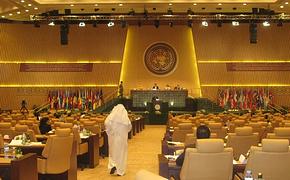
The workshop is organised by the FERDI for the French government. The government of Senegal, with whom the FERDI hast organised a conference in Dakar at the end of October on “acceleration of disbursements and aid effectiveness”, and the governments of Burkina Faso and Niger have accepted to be associated to the preparation of this workshop, to which the United Nations Department of Economic and Social Affairs (DESA) and several international institutions (IMF, World Bank, African Development Bank, European Commission…) have kindly agreed to participate.
The Doha Conference was initially designed in an international context which has been seriously altered by the financial crisis and resulting threats of a global recession. This new situation could severely compromise low income countries progress towards the MDG that is already slow. Needed is to think of the most effective way aid should be adapted to deal with this challenge. Is aid likely to play the insurance role which has often been accredited to it? Two answers are conceivable, one ex-ante and the other one ex post.
The first one is related to the geographic allocation of aid. It consists in giving priority to countries that are more likely to be affected by the crisis or any other shock with similar consequences, i.e. the most vulnerable countries, which are often the Least Developed Countries (LDCs). Structural vulnerability to exogeneous shocks is usually not included by aid agencies in their aid allocation criteria. Addressing this issue, a reform of criteria and formula of aid allocation seems desirable, as it is recommended by the Secretary General of the United Nations for the Development Cooperation Forum report organised by ECOSOC last June-July. The Economic Vulnerability Index (EVI) set up for the identification of LDCs by the United Nations could serve this purpose.
The second answer consists in reactivating aid financial instruments aiming at compensating for shocks, which until now may have been not effective enough. Is the exogeneous shocks facility created in 2005 (more concessional than the previous little-used compensatory finance facility and modified in last September) an adequate answer to possible large shocks in low income countries? On which conditions and after which possible reforms could the FLEX by the European Union be used quickly and effectively? Other mechanisms can probably be used. It is easier to accelerate disbursements with budget support than with project or programme aid. However, does it not depend on the type of conditionality applied, quick disbursements being easier with result-based conditionality than with policy instrument conditionality? Other useful innovation such as countercyclical loans recently implemented by the AFD can only constitute a limited answer at the moment due to their present coverage. Monetary guarantee may also be an effective insurance.
►Power point "Facing the crisis, which priorities in aid allocation?" (version ) (slides)
►Doha Declaration : outcome document of the Follow-up International Conference on Financing for Development to Review the Implementation of the Monterrey Consensus
Sont intervenus comme « panélistes » :
Le débat qui a suivi les présentations, bien que limité par le temps, a pu tirer le plus grand bénéfice des contributions et des présences de Abou-Bakar Traore, Ministre des Finances du Mali, de Abdoulaye Toure, Directeur National du Budget du Mali, de Sidi Ould Behaba Ould Tah, Ministre des Affaires Economiques et du Développement de Mauritanie, de Jean-Marie Ehouzou, Ministre des Affaires Etrangères du Bénin, ainsi que des représentants de différentes institutions internationales, de bailleurs de fonds bilatéraux et de la société civile.